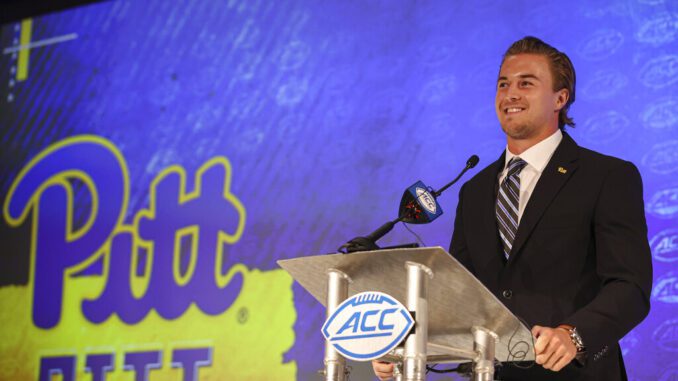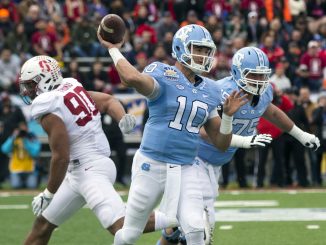
CHARLOTTE — Tony Grimes didn’t get an invitation to ACC Kickoff in Charlotte, but that’s OK. He’s got other plans.
The rising sophomore, who should actually be just a month past his high school graduation, will be signing autographs at Chapel Hill Sportswear on Franklin Street this Saturday afternoon.
The autographs are free to customers, but donations, the ad tweeted by the store proclaimed, are greatly appreciated.
Grimes’ position coach, Dre Bly, retweeted the ad shortly before the ACC Kickoff began on Wednesday morning.
Welcome to the new landscape of college sports.
Starting on July 1, the NCAA allowed student-athletes to profit from their names, images and likenesses.
Some athletes have been slow to take advantage of the potential source of revenue. Duke quarterback Gunnar Holmberg and running back Mataeo Durant both said they’ve been approached by companies but have yet to ink any deals.
“I told our players, ‘Name, image and likeness — we used to call it reputation,’” said their coach, Duke’s David Cutcliffe. “Let’s not forget that as you build this. The intention is for a player to be able to build an image and benefit from it. There’s a lot of ways you can do it, through even social media. You don’t need representation. You can give private lessons at an appropriate time. What you can’t do with name, image and likeness is get so carried away with it that you erode your image. It can be a dangerous thing.”
Some ACC players have been more aggressive. Miami defensive back Bubba Bolden and quarterback D’Eriq King both signed five-figure deals on day one — July 1. King also teamed up with a rival, Florida State’s McKenzie Milton, to start Dreamfield, a company to help other players find NIL deals that suit them.
“I’ve been knowing McKenzie for six, seven years now, back when he was in high school, UCF, I was at Houston. We’ve been in the same conference. Had a relationship,” King said. “Obviously, Florida State is our rivals. But like they say, business is business. We both thought it was a good idea to partner with Dreamfield, co-found the company. It’s really to help as many guys as we can. The whole platform is for everybody else to make a lot of money, so …”
Pitt quarterback Kenny Pickett has also jumped in with both feet. He signed a deal with Pittsburgh’s Oaklander Hotel and its restaurant, Spirits & Tables. Part of his deal includes a complementary weekly dinner with his offensive linemen.
“That was very important,” he said. “That was something that started back in my high school, actually a tradition in my high school. Carried it into college. Can only do one a season, not getting paid as much. Obviously, now have an opportunity to take all six linemen, have an extra guy go in. We can do that once a week throughout the entire season. That was obviously very important for me to get done first.”
Pickett also trademarked a logo that combines his initials and uniform No. 8, presumably to begin selling merchandise.
“It gives some young guys an opportunity to look up at a Kenny Pickett and say, ‘I want to be like him. Look what he got. How do I get where Kenny is?’” Pitt coach Pat Narduzzi said. “Everybody wants to be in Kenny shoes. It’s not a given, he’s earned everything he’s got.”
Pickett and King have both attempted to share the wealth with teammates, addressing the inequity that’s sure to come when companies begin paying some players. It’s an issue that, if not handled well, could fracture a locker room.
“It’s a dangerous part of it,” Virginia Tech coach Justin Fuente said. “There’s all sorts of scenarios. You all can imagine what they are, from guys earning money that aren’t playing or guys that “I should be playing and I’m not.” All sorts of — the litany of that. It’s difficult. It’s difficult to be a coach now. It’s more difficult than it was 10 years ago. This is another hurdle that we’ve got to find a way to continue to address, to help keep guys together and understand how it actually works.”
UNC quarterback Sam Howell has also been careful about his teammates feelings once the offers started rolling in.
“Sam Howell stood up and said, ‘I don’t want this to be about the quarterback,’” coach Mack Brown recalled. “’I don’t want it to be disruptive in the locker room.’”
Carolina has responded by pursuing group licensing to allow the team to share the wealth.
“That means that the backup right guard is going to have a chance to be involved with opportunities that he wouldn’t be if it’s three players on your team that are,” Brown said.
Of course Howell, a Heisman candidate entering his junior year, is still very much in demand.
“I hired a marketing team, so we have a marketing team working on my behalf,” he said. “They’ve done a good job kind of lifting the weight off my shoulders.”
So far, he’s only finalized one deal, and it’s hardly the big-money opportunity most would expect.
“I’ve done some things, partnered with a charity called Table in Chapel Hill,” he said. “We deliver meals to underprivileged kids come Chapel Hill. That’s my first partnership.”
Georgia Tech linebacker Ayinde Eley hasn’t announced any deals yet, but the prospect of playing in a major city was one of the draws when he transferred from Maryland.
“Yeah, Atlanta itself, even if you weren’t a college football player, anything you do in marketing, Atlanta is a good place for you just to get your name out there,” he said. “You walk the streets of Atlanta, you’ll see a famous person, a celebrity, somebody that can help you help yourself. I just feel like, with the NIL coming out and everything, Atlanta’s a great place for marketing.”
If there was one caveat that all the players seemed to agree on, however, it was that football should be the priority.
Three different players — Miami’s Bolden, UNC’s Howell and Virginia’s Keytaon Thompson — uttered the same catchphrase: “Just keep the main thing the main thing.”
“The deals come,” Bolden added. “You do it when you can do it. My main focus personally is football.”



